Vote for ten books you want to read (or reread) from the year of Woodstock, Stonewall and Nixon’s inauguration – and join us on a literary journey.
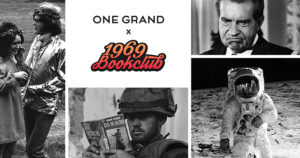
One Grand Books is launching its first book club, and we’re inviting you to join us—whether local or long-distance readers. In the 50th anniversary of Woodstock, Stonewall, and Neil Armstrong’s “small step for mankind,” the 1969 Book Club will look at novels published in that momentous year – which began with the inauguration of Richard Nixon. What, if anything, do they reveal about the concerns of the age, and how do they speak to us today? In literary terms, it was an extraordinary year, with groundbreaking novels by Philip Roth, Ursula LeGuin, and Kurt Vonnegut, as well as some enduring bestsellers, among them Mario Puzzo’s The Godfather and Michael Crichton’s The Andromeda Strain. It was also a year in which second wave feminism made its influence clear in novels by Margaret Atwood and Iris Murdoch, among others, and when the singular talent of Maya Angelou was announced with the publication of I Know Why the Caged Bird Sings. What’s more, all of these titles have all had five decades to demonstrate their longevity and worth.
We’ve selected 20 titles, each with a brief synopsis below, published in 1969, and we are now inviting you to help us whittle that list down to ten by voting for the titles you’d most like to read (or reread). We’ll be announcing the final list next week and readers will have four weeks to read each of the titles. There is no pressure to read all ten if you’d prefer to cherry pick. To sign up just send an email to us at books@grandeditorial.com and we’ll reply with further details.
As we read through the books, we’ll be posting your feedback and comments on this site, and offering a monthly live chat for wider group discussion as well as exclusive interviews with authors and the writers who champion them.
All books are available through One Grand Books to purchase at a 20 percent discount on the published price. Just follow the link to any of the titles below and we’ll ship any of the books along with the schedule for the year.
For those who live in or near Narrowsburg, look out for monthly cheese and wine book discussion salons which will be announced in our newsletter and on our social media platforms. On your marks, get set…. Read!
The Longlist
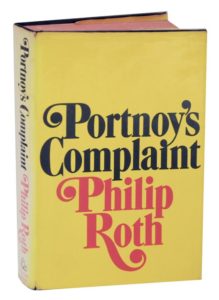 1) Portnoy’s Complaint (Philip Roth)
1) Portnoy’s Complaint (Philip Roth)
Among the most audacious novels of the 20th century, Roth’s fourth novel, described by the New Yorker as “one of the dirtiest books ever published”, is presented as one long therapy session, enabling Roth to get into maximum detail about Portnoy’s obsessive self-love. “LET’S PUT THE ID BACK IN YID!,” Portnoy famously shouts at his therapist—something that Roth would never shy from again.
Purchase book here for a 20% discount
2) The Left Hand of Darkness (Ursula LeGuin)
Le Guins’ most celebrated novel beat out Slaughterhouse Five for the 1970 Hugh Award, and still stands as among the most groundbreaking depictions of gender committed to the page with its use of gender-fluidity and neutral pronouns. It all adds up to a terrific thought experiment in which the question of war versus peace, and the uses and abuses of patriotism reverberates through an electrifying tale of intergalactic diplomacy.
Purchase book here for a 20% discount
3) Slaughterhouse Five (Kurt Vonnegut)
Imprisoned beneath the city of Dresden during the infamous 1945 Allied bombing of that city, this was Vonnegut’s account of that firestorm seen through the eyes of his protagonist Billy Pilgrim – “tall and weak, and shaped like a bottle of Coca-Cola.” Pilgrim’s war service is followed by other traumas as he establishes himself as an optometrist and raises his own family. The book’s anti-war sentiment struck a chord in 1969 and became Vonnegut’s most enduring success, while establishing him as one of America’s most distinctive literary voices.
Purchase book here for a 20% discount.
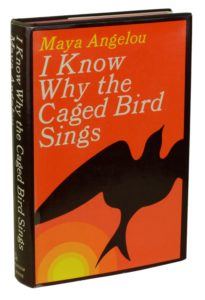 4) I Know Why the Caged Bird Sings (Maya Angelou)
4) I Know Why the Caged Bird Sings (Maya Angelou)
This evocative first volume of Angelou’s six books of autobiography is a powerful testament to a young girl’s survival in the American south during the Depression Era, as well as a paean to the power of books to rescue us from some of the depravations of life. Terrorized by racism, traumatized by rape, Angelou gives up speaking until books help to unlock her voice again.
Purchase book here for a 20% discount.
5) The Godfather (Mario Puzzo)
The groundbreaking novel that established one of the 20th century’s most iconic literary figures, Michael Corleone, as he moves up in the world of the American Mafia. As a portrait of the 1940’s criminal underworld, The Godfather remains as compelling today as it was 50 years ago, a story of blackmail, murder and family values that has fueled a fascination with the Cosa Nostra ever since.
Purchase book here for a 20% discount.
6) The Edible Woman (Margaret Atwood)
Atwood’s first novel also established some of her principal themes, particularly her concern with gender and objectification. As the title suggests, the novel works as a metaphor for the way women are marketed to men, and couples Marian McAlpin’s impending marriage with a growing revulsion for food, to the point where she can barely eat a lettuce leaf. Atwood plays with form in interesting ways, including shifting the voice from first to third person as a way to represent Marian’s increasing detachment from reality.
Purchase book here for a 20% discount.
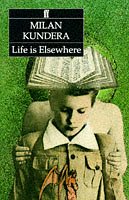 7) Life is Elsewhere (Milan Kundera)
7) Life is Elsewhere (Milan Kundera)
An intimate portrait of the relationship between a mother and her son, Life is Elsewhere follows the life of Jaromil, a posturing no-good poet growing up between World War II and the Prague Spring. Reviewing it in the New York Times, Paul Theroux wrote, “It is, among other things, a novel of tremendous elasticity, stretching in all directions as it moves forward; it is also very funny.” Kundera has fallen out of fashion since the 1980s when he was at the height of his popularity, but perhaps it’s time to bring reintroduce him to the wider reading public.
Purchase book here for a 20% discount.
8) Papillon (Henri Charrière)
Twice made into a movie, Henri Charrière’s Papillon is partially based on his own experience of incarceration and escape from a penal colony in French Guiana. Convicted of a murder he claimed he didn’t commit, Charrière made his escape in 1933, and eventually wound up living with a native Indian tribe in Colombia before being captured and sent back to French Guiana where he was placed into solitary confinement. He was pardoned of murder in 1970. Although many details have been challenged, and Charrière only ever claimed that 75% of the book was true, it has remained in print ever since.
Purchase book here for a 20% discount.
9) Memoirs of a Beatnik (Diane Di Prima)
Straddling the lines between fiction and real life, Di Prima’s Memoirs is set up as a series of (for some readers overly exhausting) sexual encounters in New York, and represents a distinct time capsule of a “1950s world of easy communal living in New York’s tenements and sex without consequences,” as Danielle Dumain put it in this 2017 appreciation. Among the few women writers of the Beats, she was a co-founder of New York Poets Society, and lives today in California where she campaigns for the Fat Acceptance Movement.
Purchase book here for a 20% discount.
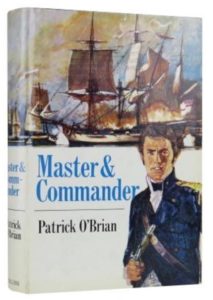 10) Master & Commander (Patrick O’Brian)
10) Master & Commander (Patrick O’Brian)
A favorite of Ursula LeGuin, and one of UK’s “Best Loved Novels” according to a BBC poll, Master & Commander launched Patrick O’Brian’s 20-novel saga of the Napoleonic Wars as seen from the high seas. “ Jane Austen on a ship of war, with the humanity, joy and pathos of Shakespeare — and brilliantly written,” raved Nicola Griffith for NPR. Even those for who turn green at the idea of a high seas adventure have found space in their hearts for Captain Jack Aubrey and ship’s surgeon Stephen Maturin.
Purchase book here for a 20% discount.
11) Fire From Heaven (Mary Renault)
The first in Renault’s Alexander trilogy, Fire From Heaven introduces us to a golden boy who dazzles almost everyone who meets him. Alexander is shown navigating complicated relationships with his parents, and then finding love with fellow warrior, Hephaestion, echoing the relationship between Achilles and Patrocolus.
Purchase book here for a 20% discount.
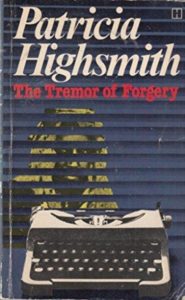 12) The Tremor of Forgery (Patricia Highsmith)
12) The Tremor of Forgery (Patricia Highsmith)
Considered by Graham Greene to be Highsmith’s best novel, and set just a few years earlier, in 1967, The Tremor of a Forgery is infused with apprehension, fueled perhaps by civil unrest in America and the Six Days War in the Middle East. Hugh Dancy, who selected it among his ten favorite books for One Grand, described it as “typically masterful in the way it measures out information and suggestion, laced with a growing sense of dread.”
Purchase book here for a 20% discount.
13) The French Lieutenant’s Woman (John Fowles)
Widely hailed as a postmodern classic, the seeds of The French Lieutenant’s Woman were planted by an image that came to Fowles, of “a woman [who] stands at the end of a deserted quay and stares out to sea.” The novel’s principal device it to overlay the story of a disgraced and abandoned woman in an English fishing town in the mid 19th century with the narrator’s voice intervening in the action, and eventually becoming a part of it. A successful movie starring Meryl Streep helped expand the novel’s reputation, and in 2010, Time magazine included it among the “100 best English-language novels published since 1923.”
Purchase book here for a 20% discount.
14) Levels of the Game (John McPhee)
Described at the time, by Robert Lipsyte in the New York Times, as “the high point of American sports journalism,” Levels of the Game is John McPhee’s stroke-by-stroke description of a 1968 tennis match between Arthur Ashe and Clark Graebner, in which he spends as much time exploring the temperaments and psychologies of the players as on the match itself.
Purchase book here for a 20% discount.
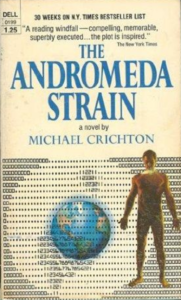 15) The Andromeda Strain (Michael Crichton)
15) The Andromeda Strain (Michael Crichton)
Crichton wasn’t even 30 when the page-turning techno thriller announced his arrival as a major writer of genre fiction. He was still working as a doctor at the time—in New York with the famous Jonas Salk—but was soon launched on a literary career, punctuated by a bout of directing movies, including Westworld and Coma, and creating one of the most successful TV shows of all time, E.R. He died at the age of 66 having written 18 novels, most of them best-sellers.
Purchase book here for a 20% discount.
16) The Green Man (Kingsley Amis)
From the celebrated author of Lucky Jim comes The Green Man, a ghost story and pitch-black comedy that relies on a finely-calibrated balance between laughter and fear. Amis was an admirer of the great M.R.James, who wrote spectacularly atmospheric chillers in the late Victorian and Edwardian era, and some of that influence shows in The Green Man, in which a series of supernatural entities haunt the 14th century inn of protagonist Maurice Allingham. But are the noises alcohol-induced hallucinations or something more terrifying?
Purchase book here for a 20% discount.
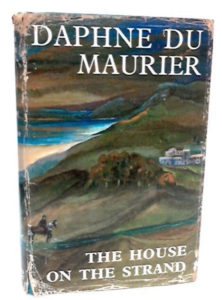 17) The House on the Strand (Daphne DuMaurier)
17) The House on the Strand (Daphne DuMaurier)
Sticking to her tried and tested gothic métier, DuMaurier’s penultimate novel in a long and fruitful career involves a drug-induced escape into the 14th century, set on the windswept Cornish coast where she lived. The catch: if you touch anyone while traveling in the past you are returned instantly to the present. The New York Times called it “prime DuMaurier.”
Purchase book here for a 20% discount.
18) Bullet Park (John Cheever)
Although a prolific writer of short stories, Cheever only wrote five novels, including this dark and disturbing exploration of the way fate can hinge on chance. A mouthwash salesman meets a stranger, setting in motion a chain of events that leads to a kidnapping. Although John Gardner, in the New York Times, described Bullet Park was a “magnificent work of fiction,” many of Cheever’s fans were unsure what to make of it at the time. “Those devotees of his New Yorker stories who mistakenly believed that, because Cheever wrote about them so accurately and compassionately, he must be one of them turned away from Bullet Park, as if Cheever had suddenly been discovered taking notes at a cocktail party,” wrote Jesse Kornbluth in a 1979 profile of the writer.
Purchase book here for a 20% discount.
19) Travels with My Aunt (Graham Greene)
Greene described this book as “the only book I have written for the fun of it,” and it shows. Not unlike Auntie Mame, it involves a larger-than-life older woman and unabashed hedonist, Aunt Augusta, who takes her bourgeois nephew on a journey from London to Istanbul and beyond to South America. George Cukor turned it into a memorable movie featuring Maggie Smith as Augusta, but you should always read the book first.
Purchase book here for a 20% discount.
20) Mama Black Widow (Iceberg Slim)
Leave it to the New York Times book critic Dwight Garner to crystalize what made Iceberg Slim such a unique writer: “Iceberg Slim’s prose was, and is, as ecstatic and original as a Chuck Berry guitar solo. Mark Twain meets Malcolm X in his sentences.” Although best known for Pimp, his visceral memoir of life on the streets of Chicago, Milwaukee, and Detroit, this book has been acclaimed by the New Yorker as “arguably his finest novel,” a truly radical for it’s time portrait of a black drag queen, Otis Tilson. Slim died in 1993, and one can’t help wondering how he’d react to a show like Ryan Murphy’s Pose, set in New York’s 1980s ball scene, or the fact that a black drag queen, Ru Paul, hosts one of the most popular reality shows in America.
Purchase book here for a 20% discount.
[yop_poll id=1]



Sounds like fun to me
Awesome idea! I work for New Canaan Library and look forward to the final list!!!! Yay such fun!
Gosh, great ‘throw-back’ titles!